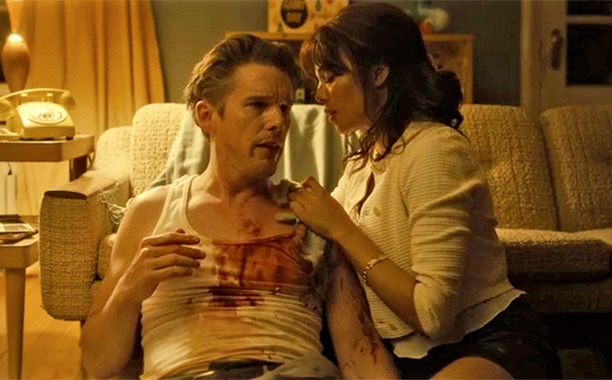Budreau, who also wrote the film, enlivens the initially standard plot with color-coded time jumps and creative editing, but more than anything, his dialogue makes the perfunctory sound revelatory. It's spare and economical, but still manages to pack an emotional punch. Chet is completely without guile, admitting to his true feelings or the failings of his past without hesitation. When Jane asks him if he's planning on killing himself because of his injuries, he immediately says yes. When someone calls him on his bullshit, which happens repeatedly, he pauses for a beat, chuckles, and admits that they're right. It's easy to see why Jane stays with him, why associates who he's burned in the past can be convinced to work with him again. Budreau writes him as intrinsically likable, and Hawke delivers in one of his most charismatic performances.
Within the drama of Chet's life, Born to Be Blue also finds time for Jane. The film doesn't automatically assume that she's completely devoted to him, that she's sacrificed her goals on the altar of this man's self-improvement. She thwarts tropes just as effectively as the rest of the film does. Much more than an unconditionally supporting sidekick and cheerleader, it's never forgotten that she has her own life as an aspiring actress, a dream that takes her away from Chet's drama and introduces conflict into their relationship. So many movies take for granted that the woman is just going to do whatever the man needs from her. Jane wants the best for Chet, but she also wants something beyond him, a simple change that makes her character stand out.
Great performances and characterization aside, Born to Be Blue sets itself apart with its relationship to drugs. In seducing Jane, Chet talks about a Chekhov line, where the feelings we feel when we're in love are the closest humans can get to their natural state. It's unclear if Chet loves jazz, Jane, or junk the most, as each gets him to an ecstatic state. Budreau sets Chet up with a rock-paper-scissors dilemma, where he can't have both heroin and Jane, but heroin helps him with jazz in a way Jane perhaps cannot. The most destructive part of his life makes him hard to work with, but he freely admits it makes him happy, too, not unlike being with Jane or up on stage. Jazz and drugs are irretrievably interlinked for him, as it was Charlie Parker who first introduced him to heroin and his club is now where he's got his comeback planned. The film builds to a simple scene of Chet sitting in front of a mirror, and to Budreau's great credit, he's created a scenario where several outcomes are just as likely and just as earned. By this point, Born to Be Blue has fully grabbed the viewer, transcending its oft-stale genre by not pasting an uplifting arc onto a real person's life.
Born to Be Blue heavily features drugs and addicts, but it dares to ask if the foibles of great artists like Charlie Parker and Chet Baker detracted from or enabled their achievements. They, and so many others, were generationally gifted musicians but what if some part of their success was due to all the substances they partook of. Born to Be Blue has more on its mind than moralizing or sanitizing. It's a comeback story and a biopic, with all that those entail, but it has such a unique perspective on what constitutes a happy ending that it makes what seems familiar seem new again. B+

 RSS Feed
RSS Feed